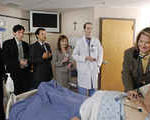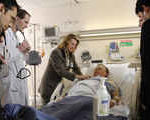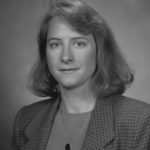Teacher of the Year Award for Kyle Klarich, M.D. — ‘I’ll show them’
Kyle Klarich, M.D. (CV ’95), Division of Structural Heart Disease, Department of Cardiovascular Medicine, and professor of medicine in the Mayo Clinic College of Medicine and Science, has always loved learning. In junior and senior high school, she pretended she didn’t love school because it wasn’t cool. But she loved it. She asked for a microscope for her 10th birthday and learned to dissect bugs, worms and frogs. She thought she’d be a scientist or a veterinarian. She entered college as a pre-veterinarian student. A high school friend who was premed suggested she get some experience volunteering at a hospital.
“I was taking animal science and poultry science classes, but my parents said when I called home all I talked about was my time volunteering at the hospital,” says Dr. Klarich. “My father asked if I’d thought about being a doctor. No one had ever suggested that, and it hadn’t crossed my mind. Medicine was still very male-dominated in the 1980s. Men were doctors, and women were nurses. My parents knew some male physicians, so I talked to them. They told me it would be a difficult career if I wanted to have a family. I’ve never been one to shy away from a challenge. They thought I couldn’t do it because I was a woman. ‘I’ll show them,’ I thought.”
Not only has Dr. Klarich succeeded in a male-dominated specialty, but she has two grown daughters who say they wouldn’t change a thing about how their childhood. And Dr. Klarich’s 2018 Teacher of the Year award from the Mayo Fellows’ Association is the first ever for a woman in the Department of Cardiovascular Medicine since the award was given in 1973.
How do you know when you’ve done a good job teaching?
 You see the light bulb go on — “Oh, yeah; that’s how that works.” Over days and weeks, you start to see the maturation of the learners.
You see the light bulb go on — “Oh, yeah; that’s how that works.” Over days and weeks, you start to see the maturation of the learners.
It’s most gratifying to see students who may have been timid become fabulous leaders with some coaching in how to lead a team.
What’s your teaching style?
My style is experiential. I try to think of one thing the learners don’t know to share each time. I emphasize to trainees that they don’t have to pretend like they know everything. We can learn together.
How have students changed through the years?
They haven’t really, but technology and the support mechanisms have changed. I used to have to go to the library and search for and copy articles to write papers. Today we have immediate availability and an explosion of information, which can overwhelm learners. We have to help them learn to sort through it and know what’s important.
What’s rewarding about teaching?
 I’m basically a nerd. I love to learn, and that pushes me to learn more myself. It’s important in medicine to impart a culture of lifelong learning, collaborative team care and mentoring. I want to inspire learners, and the high-quality learners at Mayo Clinic — fellows, residents, medical students and allied health trainees — inspire us. They push themselves to be the best they can for our patients. That culture permeates everything, and we build off of each other’s enthusiasm.
I’m basically a nerd. I love to learn, and that pushes me to learn more myself. It’s important in medicine to impart a culture of lifelong learning, collaborative team care and mentoring. I want to inspire learners, and the high-quality learners at Mayo Clinic — fellows, residents, medical students and allied health trainees — inspire us. They push themselves to be the best they can for our patients. That culture permeates everything, and we build off of each other’s enthusiasm.
Our learning environment is so rich because we share knowledge spontaneously. No one at Mayo is too busy to do that. We can be in busy clinic situations in the echo or cath lab and, if there’s a really interesting case, everyone stops what they’re doing to see it and discuss it.
What’s most challenging about teaching?
I’m a shy person, and I have to overcome that. As a teacher, I have to put myself out there, open up and expose my strengths, weaknesses and vulnerabilities. I’m not in an ivory tower, knowing everything.
Who were your teaching role models?
Bob Frye, M.D. (CV ’62), in our department also received the Teacher of the Year award this year. He’s an icon in our department, highly respected and a spectacular human being. He’s a man of few words but, when he speaks, people listen. I feel so honored to share the award with him.
 In my first year on staff I had a patient who was a prominent CEO and had aortic stenosis. I recommended he have a valve replacement. I looked really young; he thought I was the nurse at first and asked when the doctor would be coming in. He said he needed a doctor with some gray hair and experience to deliver this news to him. He admitted I was his first female physician. Instead of being offended, I had empathy for him as the patient. I found Dr. Frye, who was chair of the Department of Medicine at the time, gave him a quick history of the patient and asked him to reassure our patient. Dr. Frye went in the patient’s room and came out a few minutes later. I returned to the patient’s room, and he said, “Dr. Klarich, I will take your advice.” He’s still my patient; I see him once a year. He calls me to review any advice he gets from his other doctors. Dr. Frye must have reassured him that I was competent and correct in my recommendations.
In my first year on staff I had a patient who was a prominent CEO and had aortic stenosis. I recommended he have a valve replacement. I looked really young; he thought I was the nurse at first and asked when the doctor would be coming in. He said he needed a doctor with some gray hair and experience to deliver this news to him. He admitted I was his first female physician. Instead of being offended, I had empathy for him as the patient. I found Dr. Frye, who was chair of the Department of Medicine at the time, gave him a quick history of the patient and asked him to reassure our patient. Dr. Frye went in the patient’s room and came out a few minutes later. I returned to the patient’s room, and he said, “Dr. Klarich, I will take your advice.” He’s still my patient; I see him once a year. He calls me to review any advice he gets from his other doctors. Dr. Frye must have reassured him that I was competent and correct in my recommendations.
Carol Warnes, M.D. (CV ’88), in our department also is a role model. When I came to Mayo Clinic to interview for my fellowship in 1990, I interviewed with her. She was the first woman in cardiovascular medicine I had ever met — and the first woman in the department at Mayo. That told me Mayo Clinic was accepting of women. Dr. Warnes helped me develop my ability to teach.
Rick Nishimura, M.D. (I ’80, CV ’83, Division of Structural Heart Disease), and Sam Asirvatham, M.D. (CVEP ’00, Division of Heart Rhythm Services), also are phenomenal teachers who have influenced me.
When I interviewed at Mayo, Dr. Nishimura was the program director and asked me where I saw my career going. I told him I wanted his job because I loved education. I became the internal medicine resident associate program director and then ultimately met the goal of becoming the program director for cardiovascular medicine.
What does the Teacher of the Year award mean to you?
There are so many great teachers in our department that I never pictured myself receiving a Teacher of the Year award. I’m gratified; it’s very touching and meaningful. Receiving the award validates my goals and efforts in teaching. I’m terribly honored to be recognized for something I hold so dear. The time I’ve put into teaching has been given back to me in multitudes in enthusiasm for our shared goal of moving medicine forward and making things better for our patients.
Student comments
“Dr. Klarich has an unwavering commitment to the trainee’s education. No matter how busy her administrative or clinical duties are, whenever she has an interesting case or anything of educational value, she brings it out for us to learn.”
“I really appreciated her focus on teaching the physical exam, which is overlooked by many but remains an integral part of a cardiologist’s tool kit even in the modern era.”
“Dr. Klarich has expert methods of teaching, effectively getting the message across and making the learning points stick without creating a negative or threatening learning environment. Learning from her has always been enjoyable.”
“It’s an absolute honor and privilege to be one of Dr. Klarich’s fellows. She’s a master clinician-educator.”